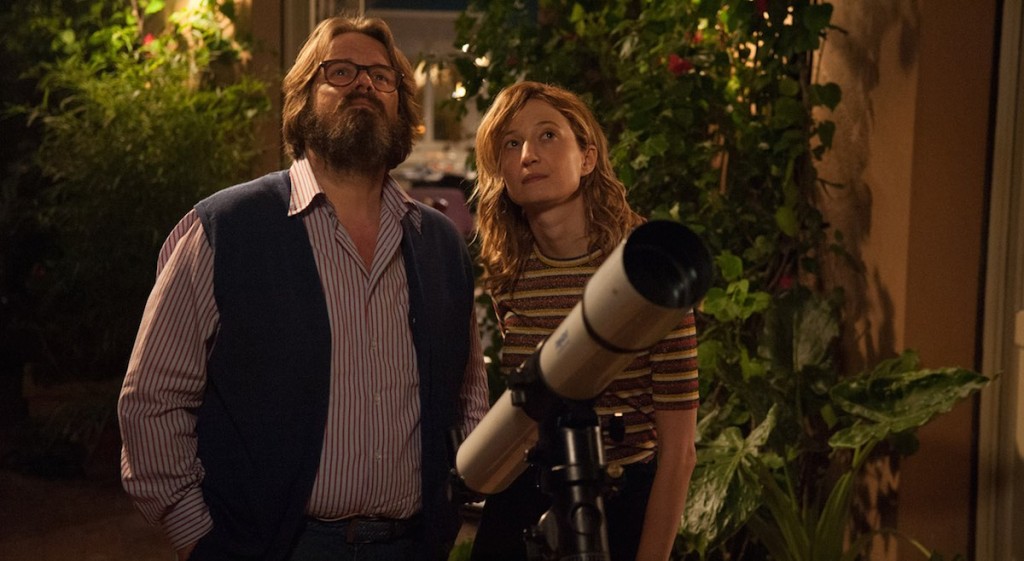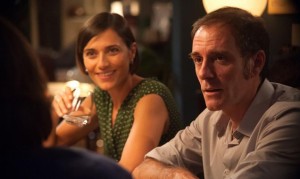
By Gary M. Kramer.
Paolo Genovese’s cheeky comedy-drama Perfect Strangers operates on the simplest—and perhaps riskiest—of principles: if our phones are all “black boxes of information” about us, is there anything in them that could possibly embarrass us in front of our spouses and dearest friends who know us so well? The answer, not surprisingly, is a resounding yes, as the characters in this nifty little morality play play a game in which all calls and texts at a dinner party are to become public knowledge. The seven friends—three married couples and a single but dating guy—may think they have nothing to hide—but then the phone rings…
Genovese met with Film International during the Tribeca Film festival where the film received its international premiere, to talk about his film.
How did you come up with the idea for this film? Do you know couples that have split up because they have looked at their partner’s phones/texts?
I’ve known various couples, but one in particular was a starting point for the film. I had a pair of friends where the guy was in a motorcycle accident and when his wife went to get him from the hospital, they gave her his cell phone, and she found a text message. They broke up before he left the hospital.
What parameters did you have in mind to create the characters?
I wanted the group to be a cross-section of friends and an Italian set of friends. One of the things that is typical of Italian friendships is how deeply rooted they are in time. Adult friends still hang out with classmates from elementary school. Their lives may have gone in completely different directions. One may be rich, one poor, one might have a good job or not, etc….I really wanted to address diversity in the film, and to have all possible types—a gay character, a married couple with children. The characters were chosen based on the underlying themes that I wanted to explore.
 What decisions did you make regarding what would be revealed about the characters before, during, and after dinner?
What decisions did you make regarding what would be revealed about the characters before, during, and after dinner?
I think in a film where you have a unity of time and place it’s important to have a very quick rhythm. In the architecture of screenplay I wanted to have these revelations little by little but in a very constant way, so we get to know the characters better, but also to change our perceptions of these characters.
It’s interesting that money, which is usually an issue for couples, wasn’t one of the topics of concern in the film. What made you address the various issues (body image, mothers-in-law, a daughter losing her virginity, jealousy with an ex, sexting a lover, etc.) that were revealed in Perfect Strangers? Did you have the 7 sins in mind?
When I wrote the first draft, we had a lot of things including a fight about money. We had to make a choice what is more interesting. Fights over money between friends or a couple was cut because that was less interesting. My choices were based on the theme of about how well we know the person/people that we are with. From this point of view, I included themes that are most interesting in regard. That was the connecting thread.
There are some very shrewd observations about marriage, relationships, family and children (selfish to have or not) in the film. What did you learn from your life that you applied to or influenced the characters in the film?
In terms of direct experience I have three children, and raising children is difficult. But I also have close friends who have decided not to have children. That is a difficult choice for some of the same reasons. At a certain point, you make a choice about having children based on the changes that they will bring about in your own life.
 There is a great scene in which a father talks to his daughter, calmly, and yet, his wife is being humiliated in the same call. How did you balance the sensitivity and insensitivity in the film?
There is a great scene in which a father talks to his daughter, calmly, and yet, his wife is being humiliated in the same call. How did you balance the sensitivity and insensitivity in the film?
I think there is a precise meaning to that scene. Not all of the secrets for the characters are going to be negative. In that instance, the wife discovers that her husband is a much better person than she thought. I think the balance in that scene is in finding a medium between these two most important affections in a man’s life—the blood relationship to his daughter, and his affection for his wife. I had to [find] a short circuit between these two types.
In contrast, Alba Rohrwacher’s character, Bianca, may be the kindest. What can you say about her pivotal character?
I think I wanted to show the various spirits that can inhabit a single character. No one character ends up in the same place at the end. I wanted to show the various aspects. In the good character, played by Alba, who is good at beginning and at the end, I wanted to show in the interim, there are many gradations of her, even though we see more black and white gradations of other characters throughout the film.
Perfect Strangers could very well work on stage as a play; it’s mostly confined to one set, yet it rarely feels stagey. How did you create the fluidity of the film—the camerawork, and keeping the characters all clearly defined?
I think the first thing that lends fluidity to the film is the screenplay itself. I was very careful not to tell the story of one character, but to tell the story of a group. At no time is one character at the center of the film. Each character is narrated by his or herself, but especially by the other characters; they are defined by the others, which lends circularity and fluidity. In terms of involving the audience in the story, the way the film was shot, I left an empty space at the table for a member of the audience. In terms of the way I shoot and the point of view, the audience joins the seven other people at the table
 None of us has a secret, but everyone has secrets. What is one of your secrets? What would we be surprised to discover from your phone?
None of us has a secret, but everyone has secrets. What is one of your secrets? What would we be surprised to discover from your phone?
[Laughs]. It’s a secret…I can’t tell you.
Do you have anything suspect on your phone?
Definitely. But [my wife] might discover something positive about me.
OK so what are your flaws and positive qualities?
[Laughs]. I think on the positive side I have a profession that blends into life you don’t know where my work and a director and screenwriter end and where my life begins. The good luck I have in doing my work allows me to live my life well. I supposed the negative side is that I am so fully immersed my professional life, I forget about everything else.
Gary M. Kramer is the author of Independent Queer Cinema: Reviews and Interviews, and co-editor of the recently published Directory of World Cinema: Argentina.
